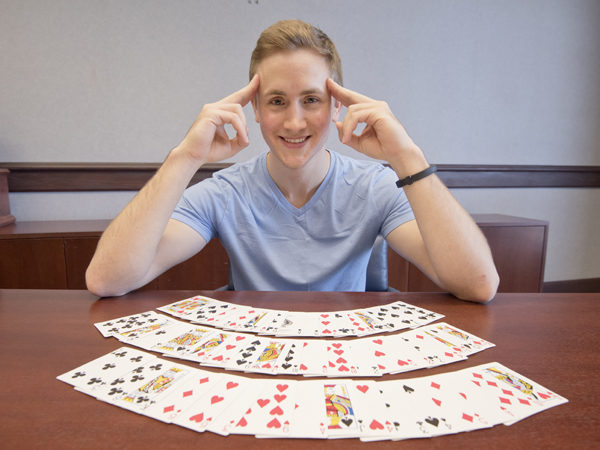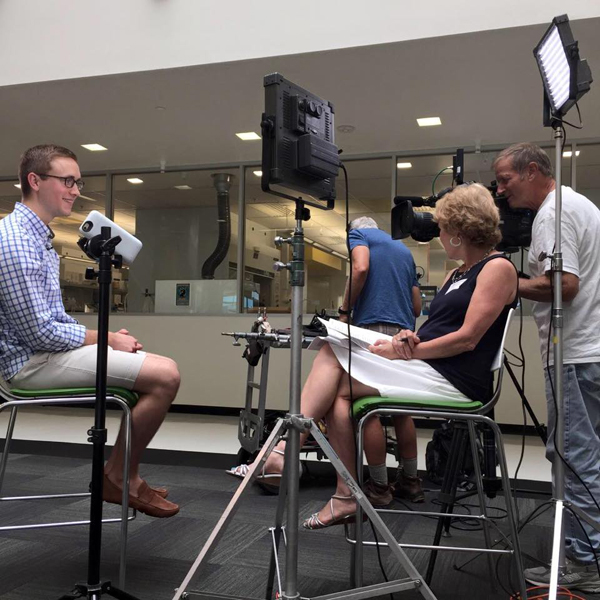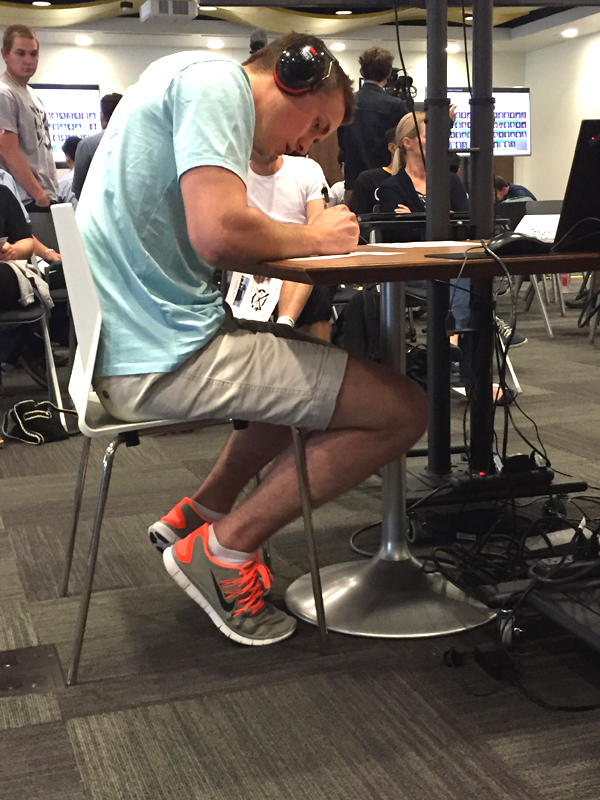People of the U: Alex Mullen

If you've ever misplaced your car keys - or your car - if you can't recall your bank PIN - or where you put your ink pen - if you don't remember why you entered a room - or the building the room came with - then Alex Mullen could make you look really bad.
He has recalled the arrangement of a 52-card deck in under 29 seconds - the only American to do so in an official competition.
He has committed to memory a series of 615 digits in order; memorized 70 made-up "historical" dates in under five minutes; and remembered correctly 102 digits in sequence - after hearing it only once.
Mullen, a second-year medical student, is a memory athlete, a world-ranked contestant who has every right to crow about his powers of recall; instead, he says: You can do it, too.
"Everybody has this ability built in," said Mullen, 22, "even though most people will tell you they don't have a great memory. I didn't either."
He didn't, he said, until discovering as a college sophomore "Moonwalking with Einstein" by Joshua Foer. Subtitled "The Art and Science of Remembering Everything," the book describes the world of competitive memorization.
In this country, that world is represented by the USA Memory Championship, patterned after the older World Memory Championships and founded in the late nineties by Tony Dottino, then an IBM executive who had been searching for a way to re-stimulate employees' creativity.
He found it during a seminar that revealed to him the potential of the human brain to store information away and not lose it, like toys in an attic.
"Memory can be learned and practiced, just as any athletic skill can be," said Dottino, a business consultant. "There's a lot you can do to build it and exercise it through any age."
But, in the Internet Age, where access to information is so quick and easy, what's the point?
The point is, Dottino said, "we're losing the ability to think.
"For example, have you ever gone to the store when the computers are down? Go to the register, pay with cash, wait for change, and the person at the counter just stares at you: 'What am I supposed to give you?'"
One solution, he believes, is to stir up interest in this mental sport. It's working: The first memory championship attracted 17 contestants. By last year, the number was 70, and he had to turn some away, he said.
"An objective of the competition is to broadcast a message across the country: Here is a way to improve your memory."
Mullen discovered the truth of that message on his own, adopting techniques from "Moonwalking" to shine up his school work and help him get into medical school.
"My memory improved pretty much instantly," he said.
This was going to be his "secret weapon," he said. But, now, he shares it on his blog, www.alexjmullen.com.
Mullen competes during the 2015 Extreme Memory Tournament (XMT) quarterfinals May 3 against Jonas von Essen, current world memory champion. Mullen would win 4-1.
He couldn't keep this to himself, or even to his classroom in Oxford, where he grew up and went to school. "I got hooked," he said, "and I couldn't stop."
Hooked on mnemonics, that is - in particular, a device known as the memory, or mind, palace, which taps into our talent for remembering context, or stories, better than we can isolated facts: You can fix anything in your mind by building a place in your imagination and furnishing it with images at certain points along the way.
Those images are connected to the numbers, names and faces, addresses, etc., you want to remember. To retrieve that information any time in the future, you stroll through your mental manse.
The method is at least as old as the ancient Greeks, and has been exploited by the likes of the BBC's version of Sherlock Holmes, on "Sherlock," and by a serial cannibal created by author Thomas Harris.
In "Hannibal," Dr. Lecter enters an alcove in one of his memory palaces to pick up the street address of Clarice Starling. The first image he encounters is a painting of St. Francis feeding a moth … to a starling.
One of Mullen's 20 or so memory palaces is his home in Oxford. In Gross Anatomy, for instance, he could have attached the brachial artery to his mailbox.
"This has definitely helped me in medical school," Mullen said. "Anything I need to memorize, such as the names of bacteria or drugs, I convert to images."
He demonstrated this skill with a playing deck, card by card: "This one's Michael Jordan, this is Gandalf, this is a particle accelerator like the one in Switzerland, this is Sparky - a guy I know" and so on. He then put Michael Jordan by the door, Gandalf on the table … you get the picture.

Mullen is interviewed by a video crew from the Today Show May 1 before competing in the 2015 XMT.
The mnemonics vary somewhat, depending on the task. To connect a name with a face, Mullen offers his as an example: Owl for "Al," licks for "lex." He wears glasses: "Owl licking my glasses."
No wonder his name is becoming unforgettable among his rivals. In 2014, he plunged into the USA Memory Championship for the first time, finishing second.
"I always liked competition. In high school, it was swimming and tennis," he said. "This is another way to compete, to push myself to do more and more."
He reached the national finals again this year, then placed fourth at the 2015 Extreme Memory Tournament, which drew memory mavens from around the world to San Diego in May. Mullen won $4,000.
"I'd like to think that covered most of my expenses up to that point," he said.
Worldwide, he's ranked 17th. In the United States, he's No. 2, based on world competition scores, which enable him to edge out four-time national champion Nelson Dellis of New York, a memory athlete since 2009 and the winner of more U.S. championships than anyone else.
"Alex is doing what I did, only his standards from the get-go were way higher and he's now breaking past them," said Dellis, who founded Climb for Memory to honor his grandmother by raising funds for Alzheimer's awareness and research. "He's humble, disciplined, and really, really good at memorizing - I like that about him."
Mullen is milking his skill outside the arena and the classroom as well, taking on the task of learning Chinese, because he can.
He will continue to compete, he hopes, on the global stage as he eyes the 24th World Memory Championship in Sichuan China, Dec. 5-15. The overall winner gets approximately $150,000 - a figure few people would have trouble remembering.

Alex Mullen’s events and accomplishments:
- Speed cards (memorize a pack of playing cards within five minutes): 28.66 seconds (He ranks sixth in the world.)
- Cards (memorize within 10 minutes): 208 cards
- Speed numbers (five minutes): 320 digits
- Numbers (15 minutes): 615 digits
- Binary digits (five minutes): 525 digits
- Historic dates (memorize years of fictitious events within five minutes): 70 dates
- Spoken numbers (memorize digits spoken at one digit per second - up to 450 digits): 102 digits
- Random words (five minutes): 30 words
- Names and faces (memorize names of people in photographs within five minutes): 46 points
- Names (memorize either first or last name of faces in photographs within 15 minutes): 125 points
- Abstract images: 301 points
- Poem/Text (memorize a poem or text within 15 minutes): 193 points
Source: World Memory Statistics website
Nominate someone for a Front and Center feature
Do you know a UMMC faculty or staff member, student or volunteer who you think should be profiled in eCV?
The editors of the Medical Center's electronic newsletter are seeking nominations for its ongoing "Front and Center" human-interest feature.
We recognize that all of our employees are dedicated to providing their best service to the institution. The POTU articles focus on individuals who have a story to tell that would be of special interest to the newsletter's general on- and off-campus readership. And the story doesn't even have to involve health care.
Know someone who has a special hobby? Who has an interesting past? Who has demonstrated a particular talent? Who has caught your attention and you're dying to learn more? We'd like to hear about it.
If you'd like to nominate someone, click here (UMMC log-in credentials required).



